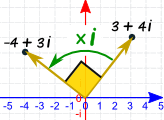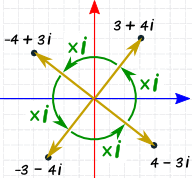|
INTRODUCTION :
I remember in math classes that when I was introduced to
'imaginary numbers',
I was influenced by their name to think of them as
some kind of 'second class' numbers --- numbers that really
do not exist --- some kind of 'ghost numbers'.
Furthermore, 'imaginary numbers' were teamed up with (added to)
'real numbers' to give
'complex numbers'.
That name 'complex number' was intimidating to me.
It immediately gave the impression of a number
that is too tough to deal with.
No wonder so many people are put off by mathematics.
Mathematicians themselves give 'off-putting' names to
the concepts with which they deal.
Who wants to spend a lot of effort dealing with 'complex numbers'?
Their very name indicates that they will be a real chore to handle.
And who wants to waste their time on 'imaginary numbers'?
It sounds like they really do not amount to anything anyway.
Their very names suggest that it is way more pleasurable to
watch TV or go tailgate at a football game than to struggle
with 'complex' numbers --- or waste time on 'imaginary' numbers.
A (very) Little History
Imaginary numbers came about around the 1400's and 1500's as
humans tried to find all the roots (solutions) to quadratic
equations --- of the form
a * x^2 + b * x + c = 0
where a, b , and c are 'real' numbers and x is the unknown
real number(s) to be found so that the left-hand-side evaluates
to zero.
In those days, in Italy, a human who thought he/she had the upper hand
in finding solutions to equations like this would challenge another
human in a public display of who could best the other.
In these publicly acted out challenges, one person would pose a
problem that the second one would be challenged to solve.
And the second one would, in turn, offer problems that the first
would be challenged to solve.
It became a game of devising solutions to equations, but keeping
those solutions secret in order to have the upper hand when
participating in these challenges.
But, just as with magician tricks, some people were motivated,
for various reasons, to reveal (publish) the methods of solution
to problems like these.
The history books tell us that one of the first people to
use 'imaginary' and 'complex' numbers as an aid in solving
challenge problems like these was
Rafael Bombelli (1526 - 1572).
And Bombelli was building on equation solving methods that were
developed, more or less secretly, by people born somewhat before him
--- such as
Gerolamo Cardano (1501 - 1576) and
Niccolò Fontana Tartaglia (1500 - 1557) and
Lodovico Ferrari (1522 - 1565).
In later years, people like the Swiss
Leonhard Euler (1707 - 1783) greatly expanded on the properties
of imaginary and complex numbers --- partly by examining
power series expansions of functions like the
exponential function and the
sine and
cosine functions.
Eventually, in the 1800's and 1900's, physicists and engineers
discovered that imaginary numbers were not so imaginary after all.
They could be used quite handily to describe what is
going on in electric circuits and what is going on in
atoms at the quantum mechanical level.
So it seems that the time is much over-due to ditch names
like 'imaginary number' and 'complex number' and use
names that are (if not descriptive of the utility of these numbers)
at least more neutral (less negative) in their expressiveness.
Suggestion 1
I suggest that we rename 'imaginary' numbers to
'perpendicular' numbers.
This comes from the fact that we humans have taken to
thinking of 'imaginary' and 'real' numbers as being pairs
of real numbers plotted on a 'complex plane'
--- with the 'real' numbers plotted horizontally
(along an x-axis) and with the 'imaginary' numbers
plotted vertically (along a y-axis).
Hence the 'imaginary' numbers are, in a sense, perpendicular
to the 'real' numbers.
In fact, when you multiply a 'real' number by the 'imaginary' number
'i', the imaginary number 'i' essentially rotates the
real number 90 degrees in the complex plane so that the
'real' number lies on the y-axis instead of the x-axis.
Further, when you multiply the 'imaginary' number 'i' by
the 'imaginary' number 'i', the imaginary number 'i'
essentially rotates 90 degrees in the complex plane
and becomes the 'real' number -1, which lies on the
x-axis instead of on the y-axis.
And, more generally, when you multiply a 'complex' number, a + b*i,
by the 'imaginary' number 'i', the imaginary number 'i'
essentially rotates the complex number 90 degrees in the
complex plane so that the 'complex' number,
a + b*i, becomes the complex number, -b + a*i.
Hence we have plenty of reasons to call the 'imaginary' number 'i' a
'perpendicular' number.
Note that 'imaginary' is 5 syllables and 'perpendicular'
is 5 syllables --- a tie.
For an even shorter name, how about 'right' number for
'imaginary' number --- as in 'right angle'?
Some others to consider: 'rectified' number or 'vertical' number
or 'erect' number or 'upright' number or ...
Suggestion 2
Note that if we are going to do away with the name 'imaginary',
we should also do something about that name 'real' ---
because if we continue to use the name 'real', this implies
that a 'perpendicular' number is not real.
Since 'real' numbers are actually an extension of the
'rational' numbers by including all the limits of sequences
of rational numbers, a name like 'extended-rational' numbers
or 'extra-rational' numbers would be fairly descriptive
without using 'emotionally discriminatory' names.
However, those names are rather long --- so I suggest using
a name like 'limit' numbers (or, even shorter, 'cut' numbers
--- after
Dedekind cut), in place of 'real' numbers.
Suggestion 3
I suggest that we rename 'complex' numbers to
'compound' numbers.
This would get rid of the negative connotation suggested by 'complex'
--- and yet indicate that these numbers are composed of a combination
of two types of numbers --- 'perpendicular' numbers and 'limit'
numbers.
In fact, I would suggest 'combination' numbers instead of
'complex' numbers --- but 'compound' number is shorter than
'combination' number.
(Maybe 'pair' number? --- even shorter.)
Note that the 'complex plane' would become the
'compound plane'.
CONCLUSION
So ... how about it, mathematicians out there ... on Earth?
Let's all agree to replace the negatively-biased terms
with the less-negative terms
FOR FURTHER INFORMATION :
For further information on these math-naming issues,
here are some links to WEB SEARCHES on keywords
related to this topic.
After the search window appears with an intial page of 'hits',
you can change or add keywords to hone the search
to what you are looking for.
|

